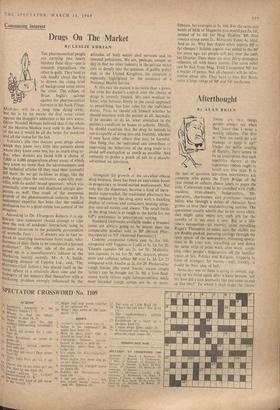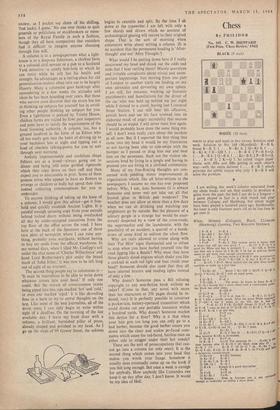Afterthought
By ALAN BRIEN
THERE are two things people always say when they learn that I. write a weekly column. The first is-----'how on earth do you manage to keep it up?' Under the polite coating of flattery, there seems to lie an assumption that.such repetitive slavery at the typewriter ribbon ought to revolt any free man. It is the sort of question television interviewers ask someone who paints the Forth Bridge all the year round or collects cheese labels to paper the attic. Columnists tend to be classified with traffic wardens, litter-chasers, hedge-cutters, lift- operators, charwomen and prostitutes---natural helots who through a defect of character have grown to love their soul-destroying routine. The questioner usually admits that he (or, more 0116, she) might quite enjoy any such job for the novelty of it, say once a year. But as a life- time's occupation-an eternity spent patrolling Roget's Thesaurus to make sure the cliches are not double-parked, pursuing cuttings through the open spaces of the newspapers, trimming quota- tioris to fit your text, travelling up and down the same strip of print week after week, scrub- bing other people's fingerprints off the familiar topics of Sex, Politics arid Religion, stripping in front of strangers for money --well, frankly, it would be their idea of hell.
Some day one of them is going to remark, zip- ping up his mind again after a hasty browse, 'tell me, how did a nice journalist like you come to end up like this?' To which I shall make the classic answer, as I pocket ni share of his shilling, 'Just lucky, I guess.' No one ever thinks to quiz generals or politicians or stockbrokers or mem- bers of the Royal Family in such a fashion, though they all have occupations that outsiders find it difficult to imagine anyone choosing through free will.
A column is to a newspaperman what a light- house is to a deep-sea fisherman, a chicken farm to a colonial civil servant or a pub to Scotland Yard detective—a comfy bolt-hole to which he can retire while he still has his health and strength. Its advantages as a resting-place for old generalisation-makers often turn out to be largely illusory. Many a columnist goes bankrupt after squandering in a few weeks the attitudes and ideas he has been hoarding over years. But those who survive soon discover that the strain lies not in thinking up subjects for yourself but in avoid- ing other people thinking up subjects for you. Even a lighthouse is policed by Trinity House, chicken farms are visited by fowl pest inspectors and pubs have to satisfy the requirements of the local licensing authority. A column, too, has a ground landlord in the form of an Editor who all too easily gets into the habit of driving up to your backdoor late at night and tipping out a load of obsolete talking-points for you to sort through next morning.
Awfully impressionable and credulous chaps Editors are as a breed—always going out to dinner and being told some garbled rigmarole which they copy down on their cuff and then expect you to unscramble in print. Some of them possess wives who appear to have no flowers to arrange or children to bully but spend their time instead collecting commonplaces for you to embroider.
To anyone thinking of taking up the lease of a column, I would give this advice—get it free- hold and quickly establish Ancient Lights. It is painful enough spinning copy from your entrails behind locked doors without being overlooked all day by under-occupied executives from the top floor of the office across the road. I have here at the back of the Spectator one of those rare plots of newsprint where I can raise any- thing, probably even marijuana, without having to buy my seeds from the official warehouse. In my nomad days, when I tilled Mr. Cudlipp's soil under the clan name of `Charles Wilberforce' and hoed Lord Rothermere's plot tinder the brand mark of `John Jelley,‘ it was rare to be left long out of sight of an overseer.
The second thing people say to columnists is— 'It must be marvellous to be able to write down whatever comes into your head.' If only one could. But the stream of consciousness resists being piped into two taps marked 'hot' and 'cold,' or even one marked 'tepid.' It is like shovelling fleas in a barn to try to corral thoughts on the hop. Like most of the best journalists, all of the worst ones, I can only begin to write within sight of a deadline. On the morning of the last available day, I leave my front door with a column, a brilliant, burnished pillar of prose, already shaped and polished in my head. As I go up the steps of 99 Gower Street, the column begins to crumble and split. By the time I sit down at the typewriter, I am left with only a few shards and slivers which no amount of archmological glueing will restore to their original shape. That is the sort of morning when columnists write about writing a column. (It is no accident that the permanent heading is 'After- thought' and not 'After Thought.')
What would I be putting down here if I really unscrewed my head and shook out the odds and ends that I hear rattling there? Mainly querulous and irritable complaints about -trivial and unim- portant happenings. Just moving from one pirt of London to another starts me feeding on my own adrenalin and devouring my own spleen.
I am still, for instance, working up fantastic punishments and humiliations for the driver of the car who was held up behind me last night while I slowed to a crawl, having lost Liverpool Street Station. I can still hear his offensive, pettish horn and see his face screwed into an elaborate mask of angry incredulity that anyone should be so stupid. I will never meet him again.
I would probably have done the same thing my- self. I don't even really care about the incident at all now. But if I reported the first thing that came into my head it' would be my frustration at not having been able to side-swipe with the bumper as I passed or drag him out and beat him on the pavement. Such are the violent ob- sessions bred by living in a jungle and having to pretend you are living in a civilised community.
Many of my free-floating thoughts are con- cerned with piddling minor improvements in organisation which, like all letter-writers to the newspapers, I assume no one has ever proposed before. Why, I ask, does Someone (it is always Someone and never me) not take out all that frosted glass in British pub windows? The weather does not allow us more than a few days when we can sit drinking and watching our neighbours go by outside. But the pleasure of a solitary gargle in a strange bar would be enor- mously deepened by a view of the cross-roads, the supermarket and the launderette, with the possibility of an accident, a quarrel or a break- down of some kind to enliven the silent flow.
Why are taxis allowed to cruise along with their 'For Hire' signs illuminated and to refuse to stop when you have hurled yourself into the road jigging like a Beatle? Why must they have those ghastly diesel engines which shake you like a cocktail at each red light and beat inside your head? Someone should also insist that they all have internal heaters and reading lights instead of only a few.
Why doesn't Someone pass a Bill refusing copyright to any non-fiction book without an index? (Come to that, any novel with more than ten characters or 250 pages should be in- dexed, too.) It is perfectly possible to construct a pocket-size, battery-operated transmitter which could drown out any portable transistor within a hundred yards. Why doesn't Someone market this device for a fiver? Why is it that when your hair gets too long you can only go to a bad barber, because the good barber sneers you down into the chair and makes po-faced com- ments which cause the red-faced, hairless men on either side to snigger under their hot towels?
These are the sort of preoccupations that can- not go into a column (or only once). It is the second thing which comes into your head that makes you worth your linage. Somehow it usually does eventually come up on the hook if you fish long enough. But once a week is enough for anybody. How anybody like Cassandra can keep it up day after day, I don't know. It would be my idea of Hell.



































 Previous page
Previous page